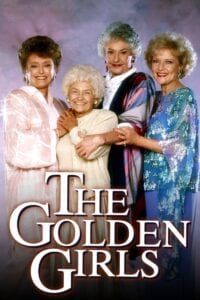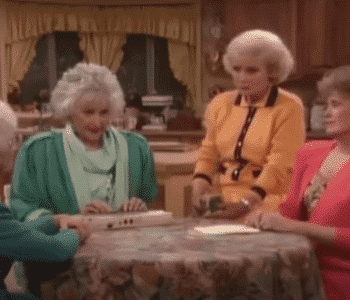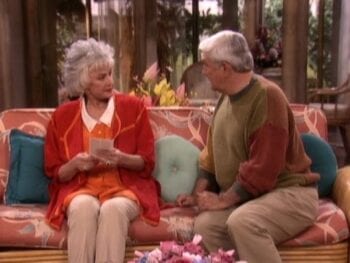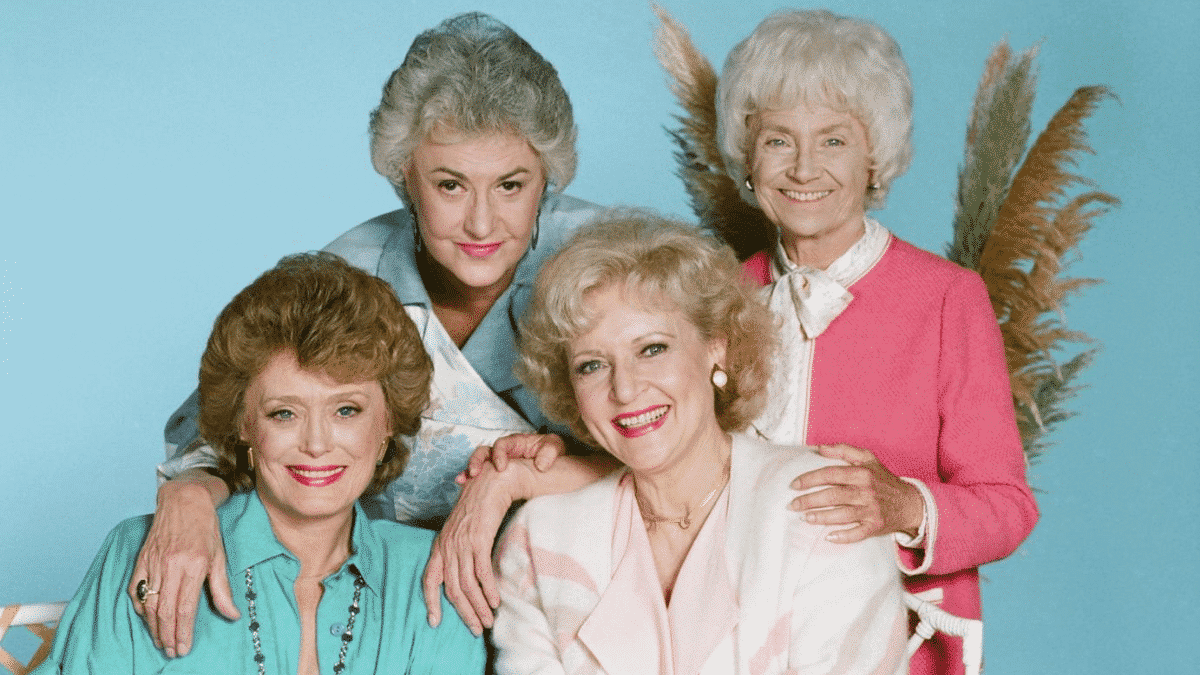Plagiarism in Pop Culture: The Golden Girls

The Golden Girls was a TV sitcom that, in many ways, was far ahead of its time. Though a comedy, the show made it a habit of tackling difficult and controversial subjects such as LGBTQ issues, racial issues, elder abuse and much, much more.
Told through the prism of four senior women who share a home, the show worked to balance the humor with the gravity of its subject matter. To that end, The Golden Girls was an unconventional show. This is especially true for its time, which includes 7 seasons and 177 episodes released between 1985 and 1992.
However, for a show dealing with as serious of topics as The Golden Girls, plagiarism is a bit out of place. As important as plagiarism is, it’s a bit odd that a show that earned a reputation for tackling some of society’s biggest issues would cover it.
But cover it the show did. Toward the end of the show’s run, in episode 14 of season 7, plagiarism took center stage. The episode, entitled Goodbye, Mr. Gordon, takes a short but deep dive into the subject of plagiarism and highlights just how stark the personal impacts of plagiarism can be.
Content Warning: Spoilers for The Golden Girls Season 7, Episode 14
The Plot

The episode begins with the phone ringing. Blanche answers and says that there is no Dorothy there and that he must have the wrong number despite the fact Dorothy is in the room. Blanche then says it was a man’s voice and that there was no way a man could want to talk with her.
When the phone rings a second time Dorothy answers it and, after a brief call, agrees to meet the other person for lunch. Dorothy reveals the person on the other end of the line is Mr. Gordon, her 11-grade English teacher from Brooklyn. She says he’s moved to Miami and is wanting to reconnect.
Sophia, Dorothy’s mother, reveals that Dorothy used to have a crush on Mr. Gordon (who was only 6 years older) and this crush drove her to do everything she could for him including grading his papers, doing his laundry and rotating his tires.

The next day, while waiting for Mr. Gordon to show up, Sophia expresses concern about Dorothy seeing him again. To calm her, Dorothy agrees to let her come along for lunch. However, once Mr. Gordon shows (and insists on her calling him Malcolm) she is instantly smitten and tries to push her mother out of the lunch date.
Over lunch, Mr. Gordon, now just Malcolm, reveals that, despite his retirement, he’s doing work writing for a book review in a local publication and was struggling with getting started. Dorothy agrees to help and they schedule a time to meet up the next day.
When Malcolm shows up the next day, he brings Dorothy flowers and even kisses her, sending Dorothy into a state of delighted shock.

That night, Dorothy is working on the article at the kitchen table and both Rose and Sophia express concern about how hard she is working on what is not her paper. However, Dorothy deflects saying that he is under a lot of pressure and, in a slip up, says she doesn’t want him to “kiss his deadline.”
After recalling how he kissed her, she goes back to work on the article.
Sometime later, Malcolm comes back by the house with an advance copy of the book review and, much to Dorothy’s horror, she quickly realizes it was just her version of the article without any changes. He says, “I didn’t need to add much” to which Dorothy responds, “I see you didn’t add my name to it.”

Malcolm promises to do it next time, but Dorothy says that there won’t be a next time. Malcolm attempts to explain that he rewrote Dorothy’s piece but the paper wanted a slew of changes with almost no turnaround time so he just submitted her version. He promises it won’t happen again to which Dorothy says, “No it won’t” before showing him the door.
The episode ends with Dorothy telling Sophia she was right and the two of them end the show with a long discussion keeping fantasies and dreams alive.
Understanding the Plagiarism
The plagiarism itself in this episode is easy to understand. Malcolm took a version of the review written by Dorothy and submitted it under his name. That is about as clear cut as a plagiarism can get.
Regardless of the time pressures he was under, he was in the wrong. His wrongness is made worse by three factors. First, this was an optional job for him and a retirement career. He didn’t need this job to live. He had the option to walk away if the pressure was too great or he wasn’t up to the task.
Second, he manipulated Dorothy into doing the work for him. Even if he did have feelings for Dorothy and was genuine with his overtures, he still exploited the fact that Dorothy had feelings for him to get her to do the work.
Finally, he was Dorothy’s English teacher and retired after forty years of work. If anyone should have known how wrong plagiarism is and worked to avoid it, it should have been him.
For Dorothy, the story is easy to understand. Her character on the show is someone that is extremely intelligent and a great writer but also someone that struggles with romance. This made her an easy target for Malcolm to exploit.
From the personal side, this story is a great one. It looks at how plagiarism sometimes happens and examines the emotional toll both from the plagiarist’s perspective and the victim’s. However, from a professional standpoint, it’s much less so.
Malcolm’s only punishment is that Dorothy boots him out of her life. She would be well within her rights to tell the editor of the paper about the plagiarism and to seek a correction for the article’s byline. There may be difficulties in proving that she wrote it (especially given the was set in 1992), but she certainly has the right to try.
In many ways, Malcolm is the winner in this story. If we assume his feelings for Dorothy were not genuine, he got the column printed and it was a success. He is free to either start writing his own work or conning someone else into “helping” him next time. He has no significant repercussions for his actions.
Dorothy did the right thing by throwing him out of her life, but Malcolm deserves professional consequences on top of the personal ones. After all, the newspaper and its readership were the ones ultimately lied to.
Still, the goal of the episode wasn’t to focus on the professional consequences of plagiarism and, instead, it focused on the personal ones. To that end, it did a solid job.
Bottom Line
The Golden Girls had a simple but effective way of approaching serious topics: Humanize them.
Rather than waxing poetic about moral platitudes or turning the show into an after school special, it focused on the human impacts of abstract concepts that often seems too distant or large to understand. It’s no different with plagiarism.
The show avoids making a big stand on plagiarism and the word “plagiarism” isn’t even used in the episode itself. Instead, it focuses on the personal toll that plagiarism takes and sought to humanize both the plagiarist and the victim.
While it may not be the most realistic approach when dealing with plagiarism, it is an effective one, especially if you’re trying to make people care about something that often seems too distant to be worried about.
More Plagiarism in Pop Culture (In Reverse Order)
Want more Plagiarism in Pop Culture? There Are 40 others to check out!
- Ferris Bueller
- Randy Feltface
- Bob’s Burgers
- Columbo (Part 2)
- Columbo (Part 1)
- Death in Paradise (Part 2)
- American Auto
- Saturday Night Live
- The Conners
- Death in Paradise (Part 1)
- Lobachevsky
- Back to School
- The Golden Girls
- Young Sheldon
- The Goldbergs (Part 2)
- King of the Hill (Part 2)
- Yesterday
- King of the Hill (Part 1)
- The Kids Are Alright
- Big Fat Liar
- Coco
- Re-Animator
- Elementary
- Instinct
- Fresh Off the Boat
- The Goldbergs (Part 1)
- Lou Grant
- Star Trek: The Original Series
- Arthur
- Criminal Minds
- Mystery Science Theater 3000
- Cheers
- WKRP in Cincinnati
- Boy Meets World
- Law & Order: Criminal Intent (Part 2)
- Law & Order: Criminal Intent (Part 1)
- Jane the Virgin
- The Waltons
- Leave it to Beaver
- The Facts of Life
Want to Reuse or Republish this Content?
If you want to feature this article in your site, classroom or elsewhere, just let us know! We usually grant permission within 24 hours.
